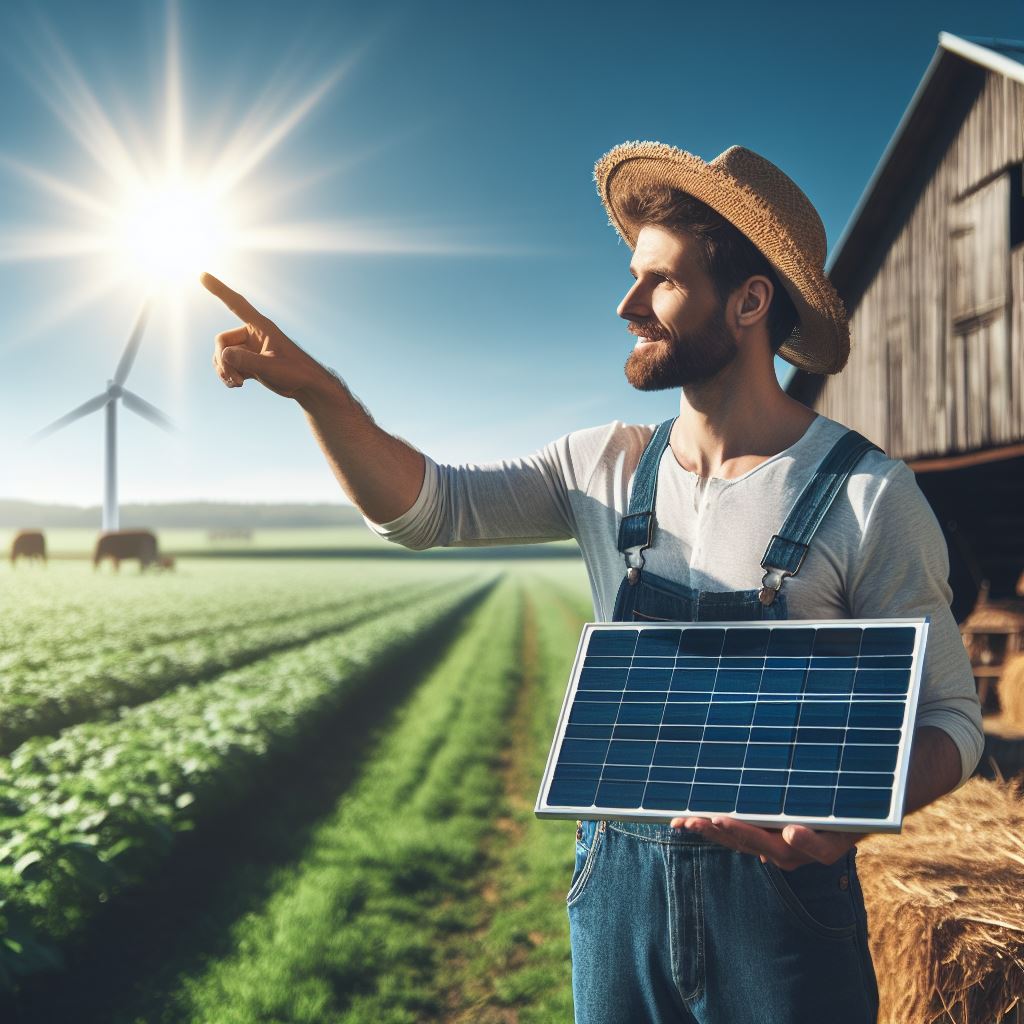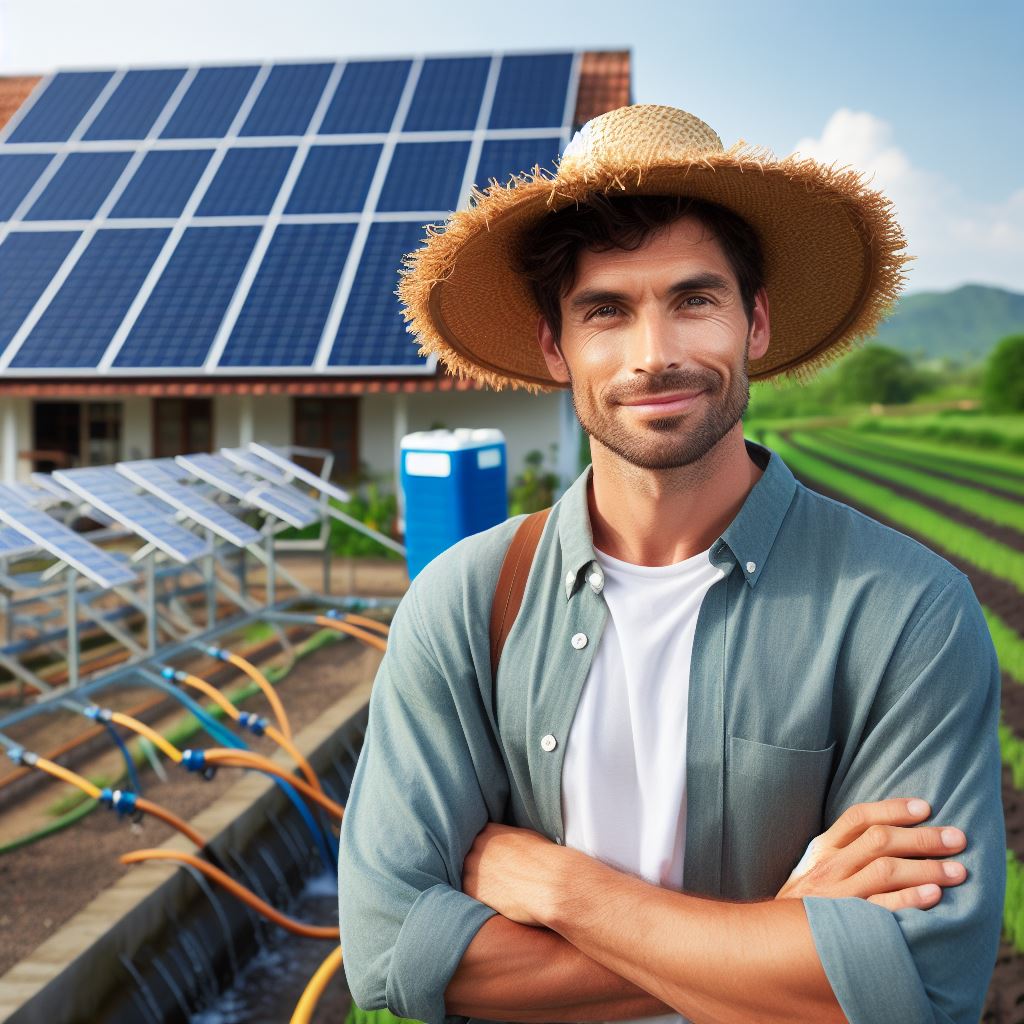Introduction
Eco farming plays a crucial role in promoting sustainable agricultural practices.
Sustainability and eco farming are deeply interconnected, as eco farming prioritizes environmental and social responsibility.
In this section, we will explore the concept of harnessing the sun’s power in eco farming practices.
Step into the enchanting world of Eco Farming, where the rhythmic dance of nature converges with innovative practices.
In this lush landscape of sustainable agriculture, we invite you to witness the seamless fusion of tradition and technology.
Discover how harnessing the Sun’s boundless power transforms mere plots of soil into thriving havens of biodiversity.
As we navigate through this green tapestry, explore the intricate web of relationships between sunlit fields, wind-kissed crops, and the nurturing embrace of fertile soil.
Join us on a voyage that transcends the ordinary, cultivating not just crops, but a sustainable legacy rooted in the vitality of Sun-powered agriculture.
Welcome to a realm where every leaf whispers tales of resilience, and every harvest bears witness to the promise of a greener, more abundant future.
The Concept of Eco Farming
Definition and principles of eco farming
Eco farming, also known as organic farming, is a sustainable agricultural practice that emphasizes environmental stewardship.
It follows principles such as promoting biodiversity, recycling resources, and minimizing the use of synthetic inputs.
Eco farming aims to create a harmonious and balanced ecosystem within agricultural systems.
It prioritizes the health of the soil, plants, animals, and humans involved in the farming process.
By avoiding the use of harmful chemicals and genetically modified organisms, eco farming protects the natural environment.
Benefits of eco farming over conventional farming methods
- Eco farming helps to preserve soil fertility and prevent soil erosion.
- It promotes water conservation and reduces water pollution.
- By avoiding synthetic pesticides and fertilizers, eco farming produces healthier and safer food.
- Organic farming methods also contribute to reducing greenhouse gas emissions and combating climate change.
- Eco farming supports local economies, as it usually involves smaller-scale farms with direct consumer connections.
Importance of reducing reliance on fossil fuels in agriculture
- Conventional farming heavily relies on fossil fuels for machinery, transportation, and production of synthetic inputs.
- This dependence contributes to carbon emissions, air pollution, and climate change.
- By embracing eco farming practices, we can reduce the carbon footprint associated with agriculture.
- Using renewable energy sources, such as solar power, can help farmers transition away from fossil fuel dependency.
- Investing in sustainable agriculture not only benefits environmental health but also ensures long-term food security.
Transitioning to eco farming is a crucial step towards sustainable and resilient agricultural systems.
Transform Your Agribusiness
Unlock your farm's potential with expert advice tailored to your needs. Get actionable steps that drive real results.
Get StartedBy following organic principles, farmers can protect the environment, maintain soil fertility, and produce healthier food for consumers.
Furthermore, reducing reliance on fossil fuels in agriculture is paramount to mitigating climate change and reducing greenhouse gas emissions.
Embracing renewable energy sources, like solar power, allows farmers to harness the sun’s energy and minimize their carbon footprint.
The shift towards eco farming not only benefits local ecosystems and public health but also ensures long-term food security.
It is time to prioritize sustainable farming practices that work in harmony with nature.
Read: Sun, Wind, Soil: Farming’s Future
Harnessing the Sun’s Power in Eco Farming
Solar energy as a renewable and sustainable resource
Solar energy is a renewable and sustainable resource that comes from the sun’s radiation.
Utilizing solar panels to generate electricity on farms
Solar panels can be installed on farms to convert sunlight into electricity, providing a clean and renewable energy source.
Applications of solar energy in agricultural practices
Irrigation systems powered by solar energy
Farmers can use solar energy to power irrigation systems, reducing their dependence on fossil fuels and saving costs.
Solar-powered livestock fencing
The solar-powered electric fences keep livestock safe and secure without relying on traditional power sources.
Solar-powered machinery and equipment
Solar energy can be used to power machinery and equipment in farming operations, reducing emissions and operating costs.
Advantages of using solar energy in eco farming
Switching to solar energy in eco farming brings numerous benefits, including:
- Reduced carbon footprint: Solar energy is clean and renewable, reducing greenhouse gas emissions.
- Cost savings: Once solar panels are installed, farmers can significantly reduce their electricity bills.
- Reliable and independent: Solar energy provides a reliable power source, unaffected by grid outages and price fluctuations.
- Long-term investment: Solar panels have a long lifespan, making them a sustainable investment for farmers.
- Environmental stewardship: By harnessing solar power, farmers contribute to a greener and more sustainable future.
In short, harnessing the sun’s power through solar energy plays a crucial role in eco farming.
Solar panels provide a renewable and sustainable energy source that can power irrigation systems, livestock fencing, machinery, and equipment on farms.
The advantages of using solar energy, including reduced carbon footprint, cost savings, and environmental stewardship, make it an excellent choice for farmers looking to adopt eco-friendly practices.
By embracing solar energy, farmers can contribute to a greener and more sustainable agricultural industry.
Read: Green Farming: Biomass Energy Benefits

Case Studies of Eco Farms Harnessing the Sun’s Power
Successful eco farms using solar energy
- Example #1: Solar-powered greenhouse to extend growing seasons
- Example #2: Solar-powered water pumps for irrigation
How these farms have benefited from harnessing solar power
Harnessing the power of the sun has proven to be a game-changer for eco farms.
By implementing solar energy systems, these farms have not only reduced their carbon footprint but have also experienced several significant benefits.
Solar-powered greenhouses are a prime example of how farms can extend their growing seasons.
With the ability to control temperature and light exposure, these greenhouses create ideal conditions for plant growth.
By relying on solar energy, they can minimize electricity costs while ensuring a sustainable and consistent supply of energy.
In addition to greenhouses, solar-powered water pumps have revolutionized irrigation practices for eco farms.
Traditional irrigation methods often require diesel-powered pumps, which are both expensive and emit harmful pollutants.
Showcase Your Farming Business
Publish your professional farming services profile on our blog for a one-time fee of $200 and reach a dedicated audience of farmers and agribusiness owners.
Publish Your ProfileBy switching to solar-powered water pumps, farms can eliminate the need for fossil fuels, reduce costs, and improve overall efficiency.
Furthermore, these eco farms have witnessed numerous benefits from their adoption of solar energy. One of the primary advantages is the significant reduction in energy costs.
Traditional farms heavily rely on electricity from the grid, which can be quite expensive.
By harnessing solar power, these eco farms can generate their electricity and greatly reduce or even eliminate their energy bills.
Moreover, solar energy systems have proven to be low-maintenance and dependable.
Once installed, solar panels require minimal upkeep, resulting in savings on maintenance costs.
Additionally, solar energy is a renewable resource, guaranteeing a continuous and reliable source of power for these farms.
Aside from economic benefits, eco farms that harness solar power contribute to a cleaner environment.
By reducing their dependence on fossil fuels, these farms significantly reduce greenhouse gas emissions and air pollution.
This positive environmental impact has far-reaching implications for local ecosystems and the global fight against climate change.
Inspiring other farmers to adopt similar practices through case studies
The success stories of eco farms that have harnessed solar power serve as a powerful motivation for other farmers.
By sharing case studies and experiences, these farms inspire and encourage more farmers to adopt similar practices.
Case studies provide tangible evidence of the benefits and feasibility of implementing solar energy systems on farms.
They showcase real-world examples of how solar power can improve agricultural practices and, ultimately, increase profitability.
By highlighting the positive outcomes and lessons learned, these case studies serve as invaluable resources for farmers looking to make sustainable changes.
Moreover, case studies help address common concerns and misconceptions surrounding solar energy in farming.
They provide practical insights into the installation process, costs, and return on investment.
By demonstrating the long-term benefits and positive impacts, farmers can overcome any hesitations or doubts they may have about transitioning to solar energy.
In fact, eco farms that harness the sun’s power through solar energy systems have proven to be successful and beneficial in multiple ways.
Through examples such as solar-powered greenhouses and water pumps, these farms have extended growing seasons, reduced costs, and minimized environmental impact.
By sharing their experiences, these farms inspire and encourage other farmers to adopt similar practices, ultimately driving the widespread adoption of sustainable farming methods.
Read: Wind Turbines: Farming’s Silent Helpers
Challenges and Considerations in Implementing Solar Power on Farms
Initial investment and costs of installing solar panels
- High initial investment of installing solar panels makes it a challenge for farmers.
- The cost of purchasing and installing solar panels can be a significant financial burden.
- Farmers may need to secure financing or seek government grants to afford solar panel installation.
- The return on investment may take several years before farmers start reaping financial benefits.
Technical considerations for optimal solar panel placement on farms
- Proper orientation and angle of solar panels are crucial for maximizing energy production.
- Farmers need to consider the location of existing structures, trees, or shadows that may obstruct sunlight.
- Assessing the available land area and determining the most efficient arrangement for solar panels is essential.
Potential limitations or challenges faced by farmers in specific regions or climates
- Farmers in regions with limited sunshine may face challenges in generating sufficient solar energy.
- Extreme weather conditions like heavy snow, hail, or strong winds can potentially damage solar panels.
- Farmers located in areas prone to frequent cloud cover or fog may experience reduced solar panel efficiency.
Available government incentives and funding options for solar-powered farms
- Government incentive programs such as tax credits or grants can offset the cost of solar panel installation.
- Farmers can explore funding options specifically designed to support renewable energy projects.
- Some governments offer net metering programs, allowing farmers to earn credits for excess energy produced.
Implementing solar power on farms involves various challenges and considerations.
The initial investment and costs of installing solar panels can be daunting for farmers, requiring financial planning and seeking support through grants or financing options.
Additionally, technical aspects such as proper panel placement, considering potential obstructions, and efficient land utilization are crucial for optimal energy production.
Farmers in regions with limited sunshine or prone to extreme weather conditions may face additional limitations.
However, government incentives and funding options can alleviate some of the financial burdens and encourage the adoption of solar power.
Through these challenges and considerations, eco-farming can harness the sun’s power sustainably, benefiting both the environment and farmers.
Read: Solar Solutions for Modern Farms
Conclusion
The significance of eco farming in sustainable agriculture cannot be overstated.
Eco farming practices prioritize the health of the environment, the well-being of farmers, and the production of nutritious food.
Harnessing the sun’s power in eco farming offers numerous benefits.
It reduces reliance on fossil fuels, decreases greenhouse gas emissions, and provides a clean and renewable source of energy.
We strongly encourage farmers to explore solar energy options and adopt eco farming practices.
By doing so, they can contribute to a more sustainable and resilient agricultural system.
Let’s harness the power of the sun to nurture our planet and cultivate a brighter future for all.




